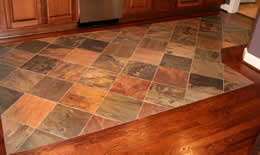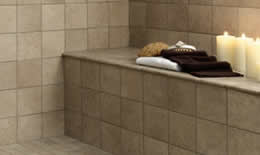|
We offer FREE ESTIMATESRJA Floors provides dependable service and quality craftsmanship. Contact us today to schedule a FREE consultation and estimate!
Tile Flooring: |
Tile Shading:- Many tiles, both glazed and unglazed, are deliberately produced with a wide shade variation to capture the natural beauty of the product.
- A certain degree of shade variation is inherent in all ceramic tile. - The manufacturers limit the amount of shade variation within a carton by sorting the tile as it comes off the production line. Also, the shade and run numbers are marked on each carton. - To minimize any noticeable shade variations, the installers work out of several cartons simultaneously. In doing so, they are able to blend the tiles together. |
Tile Sizing:- The sizes of the tiles will vary slightly. This is inherent with most tiles.
- Most manufacturers will keep sizing to an acceptable level by sorting the tile by size prior to packing it. - The grout joints will conceal slight size variations. NOTE: If either the sizing or shading is too apparent, the installer should not set the tile. Normal vs. Actual Sizing: Although most tile is advertised and sold by nominal sizes such as 8”x 8” or 12”x 12” the actual sizes will be more like 7 7/8” x 7 7/8” or 11 7/8” x 11 7/8”. |
Facts about the Clay Body:- The clay body, which is also called the bisque, consists of various types of clay and other minerals. Combined, these raw materials give the bisque its strength and stability.
- The strength of the bisque is also determined by its density. The strongest bisques, those suited for heavy commercial installations, have the smallest and least number of air pockets. - The density of clay also determines if the tile is suitable for outdoor use. Tiles that are too porous, absorbing more than 3% moisture will freeze and crack if installed outdoors in cold climates. The density of the tile is measured by the amount of water it absorbs: Non-Vitreous Tiles absorb 7% or more of their weight in water. Suited for indoor use only. Semi – Vitreous Tiles absorb 3% to 7% water. Suited for indoor use only Vitreous Tiles absorb 0.5% to 3% water. Suited for both interior and exterior use. They are frost resistant. Impervious Tiles absorb between 0 and 0.5% of their weight in water. Suited for both interior and exterior use. They are frost resistant. They are also considered the strongest tile. |
Facts about the Glaze:- The glaze is a liquid glass that has been sprayed or poured onto the surface of the tile. It is then fused and hardened by means of tremendous heat.
- The colors of the glaze are made from a mixture of minerals such as gold, silver, zinc, copper, mercury, cobalt and many others. - The strength and wear resistance of the glaze is determined by its hardness. The following factors may effect this hardness: Temperature: - The higher the temperature of the kilns (ovens) the harder the glaze. Colors: - Dark color glazes such as blacks and blues are usually softer than light colored ones. Gloss Levels: - Shiny glazes are usually softer than matte or satin finished glazes. |















